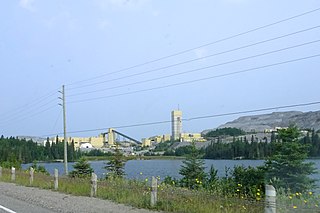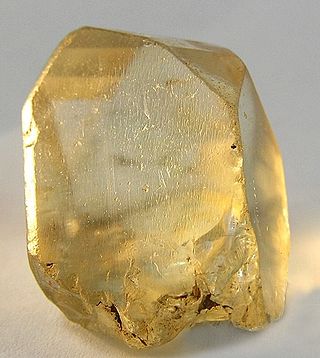 | |
| Company type | Public |
|---|---|
| Founded | 2003 |
| Headquarters | Seattle, Canada |
The Century Mining Corporation is a Canadian gold producer formed in 2003. [1] The company has produced 9.4 million ounces of gold. [2]
In 2012 the company entered insolvency. [3]
 | |
| Company type | Public |
|---|---|
| Founded | 2003 |
| Headquarters | Seattle, Canada |
The Century Mining Corporation is a Canadian gold producer formed in 2003. [1] The company has produced 9.4 million ounces of gold. [2]
In 2012 the company entered insolvency. [3]

Mining is the extraction of valuable geological materials and minerals from the surface of the Earth. Mining is required to obtain most materials that cannot be grown through agricultural processes, or feasibly created artificially in a laboratory or factory. Ores recovered by mining include metals, coal, oil shale, gemstones, limestone, chalk, dimension stone, rock salt, potash, gravel, and clay. The ore must be a rock or mineral that contains valuable constituent, can be extracted or mined and sold for profit. Mining in a wider sense includes extraction of any non-renewable resource such as petroleum, natural gas, or even water.

Barrick Gold Corporation is a mining company that produces gold and copper with 16 operating sites in 13 countries. It is headquartered in Toronto, Ontario, Canada. It has mining operations in Argentina, Canada, Chile, Côte d'Ivoire, Democratic Republic of the Congo, Dominican Republic, Mali, Papua New Guinea, Saudi Arabia, Tanzania, the United States and Zambia. In 2023, it produced 4.05 million ounces of gold at all-in sustaining costs of $1,335/ounce and 420 million pounds of copper at all-in sustaining costs of $3.21/pound. As of 31 December 2023, the company had 77 million ounces of proven and probable gold reserves.

Eldorado Gold Corporation is a Canadian company that owns and operates gold mines in Turkey, Greece and Canada. Since its merger with European Goldfields in 2011 the company has been pursuing the development of the Skouries mine, Olympias mine and Stratoni mine in Greece. The company previously developed and operated gold mines in China, Brazil and Mexico. Headquartered in Vancouver and listed on the Toronto and New York Stock Exchanges, Eldorado Gold has developed and operated assets from several merged companies HRC Developments Corporation, Afcan Mining Corporation, Sino Gold Mining, Brazauro Resources, Integra Gold, as well as European Goldfields.
Newmont Corporation is an American gold mining company based in Greenwood Village, Colorado. It is the world's largest gold mining corporation. Incorporated in 1921, it owns gold mines in Nevada, Colorado, Ontario, Quebec, Mexico, the Dominican Republic, Australia, Ghana, Argentina, Peru, and Suriname. In addition to gold, Newmont mines copper, silver, zinc and lead.
The Ashanti Goldfields Corporation is a gold mining company based in Ghana that was founded by Joseph Ellis and Joseph Biney both from Cape Coast. The Ashanti Mine, located at Obuasi, 56 km south of Kumasi, has been producing since 1897. During the turn of the century 1900, the Ashanti Goldfields Corporation was among the most important gold mining companies listed at the London Stock Exchange. The mine is sited on one of the world's major gold deposits and is one of the ten largest in the world.

Gold mining is the extraction of gold by mining.

Newcrest Mining Limited is an Australian-based corporation which engages in the exploration, development, mining and sale of gold and the froth flotation product, gold-copper concentrate. It is Australia's leading gold mining company and its operations have expanded beyond Australia, for example Indonesia, thus becoming a prominent international mining corporation. Newmont initially started the company as a subsidiary in 1966. The subsidiary became Newmont Holdings Pvt Ltd in 1980 and in 1990 acquired 100 per cent of Australmin Holdings Limited taking the current name.

Tarkwa is a town and is the capital of Tarkwa-Nsuaem Municipal district, a district in the Western Region southwest of South Ghana. Frequently dubbed as the "Golden City" by its indigenous populace, the region is characterized by a rich tapestry of Fante communities, among which include Efuanta, Tamso, Aboso, Akoon, Nzemaline, and Kwabedu.

Obuasi is a gold mining community and town which is the capital of the Obuasi Municipal District in the Ashanti Region of Ghana. It lies in the southern part of the Obuasi Municipal, 39 miles south-west of Ashanti capital city Kumasi. Obuasi has a population of 175,043 people. Obuasi mining community has a mixture of the Ashanti people culture and the semi-island exclave Ashantiland.

Paracatu is a municipality in the state of Minas Gerais in Brazil. The name is of Tupi origin, translated "good river", from "Para" (river) and "katu" (good).

The Mineral Revolution is a term used by historians to refer to the rapid industrialisation and economic changes which occurred in South Africa from the 1860s onwards. The Mineral Revolution was largely driven by the need to create a permanent workforce to work in the mining industry, and saw South Africa transformed from a patchwork of agrarian states to a unified, industrial nation. In political terms, the Mineral Revolution had a significant impact on diplomacy and military affairs. Finally, the policies and events of the Mineral Revolution had an increasingly negative impact on race relations in South Africa, and formed the basis of the apartheid system, which dominated South African society for a century. The Mineral Revolution was caused by the discovery of diamonds in Kimberly in 1867 and also by the discovery of gold in Witwatersrand in 1886. The mineral mining revolution laid the foundations of racial segregation and the control of white South Africans over black South Africans. The Mineral Revolution changed South Africa from being an agricultural society to becoming the largest gold producing country in the world.
Endeavour Mining plc is a multinational mining company that owns and operates gold mines in Côte d'Ivoire, Burkina Faso and Senegal. The company is headquartered in London, England, and is listed on the London Stock Exchange. It is a constituent of the FTSE 250 Index.

The mining industry of the Democratic Republic of the Congo produces copper, diamonds, tantalum, tin, gold, and more than 63% of global cobalt production. Minerals and petroleum are central to the DRC's economy, making up more than 95% of the value of its exports. According to a 2011 report the total value of the major mineral reserves in the DRC amounted to a total of over 300 billion US dollars at the time. The mining industry in the DRC mainly consists of private, large industrial mines, semi-industrial, and artisanal mines. While private sectors take on large operations, they rely heavily on artisanal mining for extraction of resources. These industries along with non-for-profit organizations are continuously changing their guidelines as the DRC becomes more and more desirable for their valuable minerals. Mining in the DRC took place beginning in the 14th century and is still very present today, with mass scale lootings halting many major projects. The main countries involved in the mining operations in the DRC are Canada and China along with 25 other international mines active in the area. While technological companies strive for sustainable production and consumption of their products using cobalt, this is often achieved by the work of artisanal mining in hazardous and unjust working conditions. The process of mining and extraction in any area has negative impacts on the environment and those living in it, however, the DRC has faced many acts of environmental injustice including child labor under fatal conditions, exploitation of laborers, and displacement.
Asa Resources Group is a mining company based in Johannesburg and London. According to the company's website, it is the first African-owned and African-managed business to be listed in the Resources sector of the London Stock Exchange's Alternative Investment Market. Asa was founded in 1987.

The Mining industry of Ghana accounts for 5% of the country's GDP and minerals make up 37% of total exports. Gold contributes over 90% of the total mineral exports. Thus, the main focus of Ghana's mining and minerals development industry remains focused on gold. Ghana is Africa's largest gold producer, producing 80.5 t in 2008. Ghana is also a major producer of bauxite, manganese and diamonds. Ghana has 20 large-scale mining companies producing gold, diamonds, bauxite and manganese; over 300 registered small scale mining groups; and 90 mine support service companies. Other mineral commodities produced in the country are natural gas, petroleum, salt, and silver.

The mining of minerals in Nigeria accounts for only 0.3% of its gross domestic product, due to the influence of its vast oil resources. The domestic mining industry is underdeveloped, leading to Nigeria having to import minerals that it could produce domestically, such as salt or iron ore. The rights to ownership of mineral resources is held by the Federal Government of Nigeria, which grants titles to organizations to explore, mine, and sell mineral resources. Organized mining began in 1903, when the Mineral Survey of the Northern Protectorates was created by the British colonial government. A year later, the Mineral Survey of the Southern Protectorates was founded. By the 1940s, Nigeria was a major producer of tin, columbite, and coal. The discovery of oil in 1956 hurt the mineral extraction industries, as government and industry both began to focus on this new resource. The Nigerian Civil War in the late 1960s led many expatriate mining experts to leave the country. Mining regulation is handled by the Ministry of Solid Minerals Development, who are tasked with the responsibility of overseeing the management of all mineral resources in Nigeria. Mining law is codified in the Federal Minerals and Mining Act of 1999. Historically, Nigeria's mining industry was monopolized by state-owned public corporations. This led to a decline in productivity in almost all mineral industries. The Obasanjo administration began a process of selling off government-owned corporations to private investors in 1999. The Nigerian Mining Industry has picked up since the "Economic Diversification Agenda", from Oil & Gas, to Agriculture, Mining, etc., began in the country.
Rand Refinery (Pty) Limited is the world's largest integrated single-site precious metals refining and smelting complex. It was established in 1920 to refine gold within South Africa, which had previously been refined in London.

Mining has been practiced in Taiwan for hundreds of years. Sulfur was an early important resource collected on the island. Coal mining expanded in the 19th century to keep up with demand from increased foreign trade. Heavy industry was further expanded under Japanese rule, but air raids towards the end of World War II decimated mining infrastructure, falling below 19th century production levels. Copper mining expanded in the mid-20th century, but ended in the 1980s following a global collapse in the price of copper.
The Osisko Mining Corporation is a Canadian company that conducts mineral exploration work with a focus on seeking to develop a gold mine in Ontario or Quebec. The company adopted its name following the 2015 merger of five companies that resulted in the re-uniting of the executive management team of the original Osisko Mining Corporation.